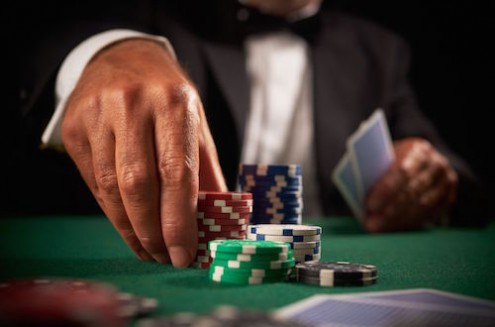According to the National Council on Problem Gambling, approximately three million American adults have a gambling addiction. Damon Dye, EdD, sheds some light on what gambling addiction really is and what you can do to help yourself or a loved one who’s addicted.
A gambling addiction is similar to drug or alcohol addiction, because biochemical changes happen in the brain that make it nearly impossible for the addict to control or modify their behavior. Damon Dye, a licensed mental health professional and a National Board Approved Clinical Consultant for the National Council on Problem Gambling, estimates that a gambling addiction affects around three percent of the population. Between 95 and 97 percent of people can gamble without becoming addicted.
Casual vs. Problematic
So, how can you tell when your gambling habits have crossed from recreational to addictive? Most gambling is done socially, so signs you may be addicted can include things like hiding your gambling, spending money you can’t afford to lose, selling items just to fund your gambles, and letting the time spent gambling affect your social, work, and family life.
There are two main types of gambling. The first is action gambling, which includes sports betting and dog track racing, and focuses on the action and thrill of all the commotion. The second type is called escape, and includes the more private gambling like slot machines. With either type of gambling, money becomes a vehicle for the problem; you can make huge wagers and win big, or lose big. Even if you win, you may still be addicted if you are sacrificing important work or family time to be there.
Identifying and Treating Gambling Addiction
Unlike gambling, an alcohol or drug addiction can be easier to spot because it affects you physically and mentally. Gambling is less apparent because it’s hidden deep within the mind. Potential red flags you may notice include a personality change, discrepancies with money, no sense of trust, or something you just can’t place your finger on. Lying about gambling and betting more than you intended also indicate that help is needed.
Treatment for gambling addiction is similar to drugs and alcohol. Dye recommends a family use as many resources as you can find to get started. You can use a Gambler’s Anonymous group, find a professional counselor, or both.
Sometimes, the chance of developing an addiction is increased with certain underlying factors like ADD, depression, or bipolar disorder. Getting a specialist to rule these elements out will help you treat it more accordingly. Lastly, if you or someone you know may have a gambling problem, please call 1.800.522.4700 for support.
In the accompanying audio segment, Damon Dye, EdD, LMHC, BACC, shares why gambling addictions, even though very prevalent, aren't taken as serious as other addictions, as well as how to spot the warning signs.

Health Topics A-Z
Gambling Addiction: How to Spot the Warning Signs
Guest
: Damon Dye, EdD, LMHC, BACC
From the Show: Staying Well
Summary: A whopping 88 percent of U.S. adults have gambled at some point in their life; but when does it turn into a problem?
Air Date: 3/9/15
Duration: 10
Host: Melanie Cole, MS
Alonso Chavarriaga
Alonso is a long-time health and wellness advocate who loves to write about it. His writing spans the scope of blogs, educational magazines, and books, both on and offline.
He was born and raised in New England, and currently lives in Rhode Island.
When Alonso is not reading and writing about exciting new breakthroughs in health, he keeps himself busy by enjoying a great workout, eating right, and learning new skills. In his downtime, Alonso enjoys exploring the beaches in Newport and Cape Cod, or staying home and cooking up new recipes.
Tagged under




 Damon Dye, Ed.D., is a Licensed Mental Health Counselor/Supervisor, a National Certified Gambling Counselor/Supervisor, and a National Board Approved Clinical Consultant for the National Council on Problem Gambling.
Damon Dye, Ed.D., is a Licensed Mental Health Counselor/Supervisor, a National Certified Gambling Counselor/Supervisor, and a National Board Approved Clinical Consultant for the National Council on Problem Gambling.